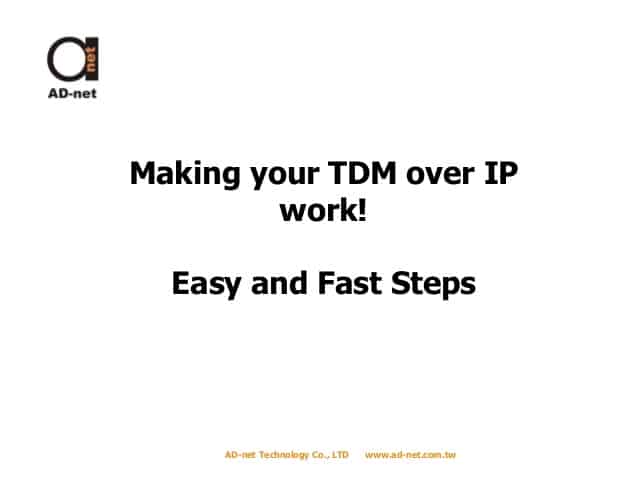- Up to 4 E1 or 4 T1 over IP | Ethernet network | TDM over IP converter
- T1 / E1 switch can be done via Web manager utility
- Easy to use and convienent Web Manager as a management feature (not available at special economy cost down versions)
- Point to Multipoint feature supported
- Cascading function to increase the capacity – 2 additional Ethernet data ports for downlink
- Stable E1 clock recovery, low jitter and wander
- Low processing delay for E1 channels, high bandwidth usage efficiency
- Resist to packet loss, with PCM frame synchronization protection
- User definable packet size from 128 bytes up to 1408 bytes
- Enough jitter buffer to resist packet delay variation (PDV)
- Local Ethernet port throughput limiting, assuring E1 QoS
- Local and remote E1 LOS and AIS and packet loss indication for trouble-shooting and maintenance
- Adaptive E1 port impendence (75 and 120 ohm) for coax and twisted pair cables
- User selectable level 2 (Ethernet) or level 3 (IP) encapsulation options
- Quick setup hardware mode switch
APPLICATION
Point to Multipoint application:

Point to Point scenario:

Configuration examples:

| Items | Description | |
| AN-TDM-IP-4E1 | 1 uplink, 4E1s | |
| Interface | Uplink | Comply with IEEE 802.3 |
| E1 Port | 4 E1 Ports supported
Comply with G.703 Impedance: 75 and 120 |
|
| User Data Port
Note: only available on AN-TDM-IP-4E1 and AN-TDM-IP-2E1/2D |
4 User Data Ports Supported
Comply with IEEE 802.3 10/100Mbps auto-sensed Full/Half Duplex auto-sensed |
|
| Console | RS232, DB9F | 9600-8-N-1 |
| Power Supply | AC Type | 220V (165~ 265V) |
| DC Type | 48V (36V~-72V) | |
| +24V(+18V~+36V) | ||
| Consumption | 10W | |
| Working Environment | Temperature | 0~ 50 |
| Relative Humidity | 90% (non-condensing) | |
| Dimension | W x H x D (mm): | 440 x 44 x 209 |
| AN-TDM-IP-2E1/2D | E1 to Ethernet converter (TDM over IP) , with 2-port E1 and 2-port 10/100Base-T interfaces for downlink, 1-port 10/100Bast-T interfaces for uplink 75 ohm/ 120ohm optional, DC-48V/AC220V optional |
|
| AN-TDM-IP-2E1 | E1 to Ethernet converter (TDM over IP), with 2-port E1 interface for downlink, 1-port 10/100 Base-T interfaces for uplink, 75ohm/120ohm optional, DC-48V/AC220V optional |
|
| AN-TDM-IP-4E1 | E1 to Ethernet converter (TDM over IP) ,with 4-port E1 and 4-port 10/100Base-T interfaces for downlink, 1+1 ports 10/100Base-T interfaces for uplink, 75ohm/120ohm optional, DC-48V/AC220V optional |
Description
As a cost effective solution for the traditional telecom services migrate to the IP packet networking technology, AN-TDM-IP-4E1 adopts the innovative TDM over IP technology, it transports the legacy E1 data through the existing IP network.
AN-TDM-IP-4E1 is the new generation of the TDM over IP equipment with IP circuit emulation that supports transportation of two E1 and two local Ethernet ports over the IP network. The uplink port and user data ports are IEEE 802.3 compliant, 10/100BaseT auto-sensed Ethernet ports.
The state-of-the-art design provides the highest availability with the accurate timing signal and data bit stream reconstruction. Predefined system parameter profiles that according to different application requirements ultimately simplify the installation process and saving the maintenance cost.
Telecom and Enterprise users can save a lot of access and equipment costs and generates new revenue by offering different types of service over existing Ethernet networks. It is also suitable for connecting to the wireless equipment to achieve fast deployment of E1 services. One particular application is to build E1 links with low cost Wireless LAN bridges, replacing much more costly microwave radios. Operators can use AN-TDM-IP-4E1 to provide legacy TDM services over wired or wireless packet network.
The heart of AN-TDM-IP-4E1 is the TDM/Packet processing unit. It truncates E1/T1 data stream, putting the data into Ethernet packet with or without IP headers. The packets are passed to the Ethernet switch unit via MII interface, and are sent out adaptive the uplink ports. Ethernet data from two local data port are also sent out through the uplink ports, but with lower priority than those packets containing E1/T1 data.

